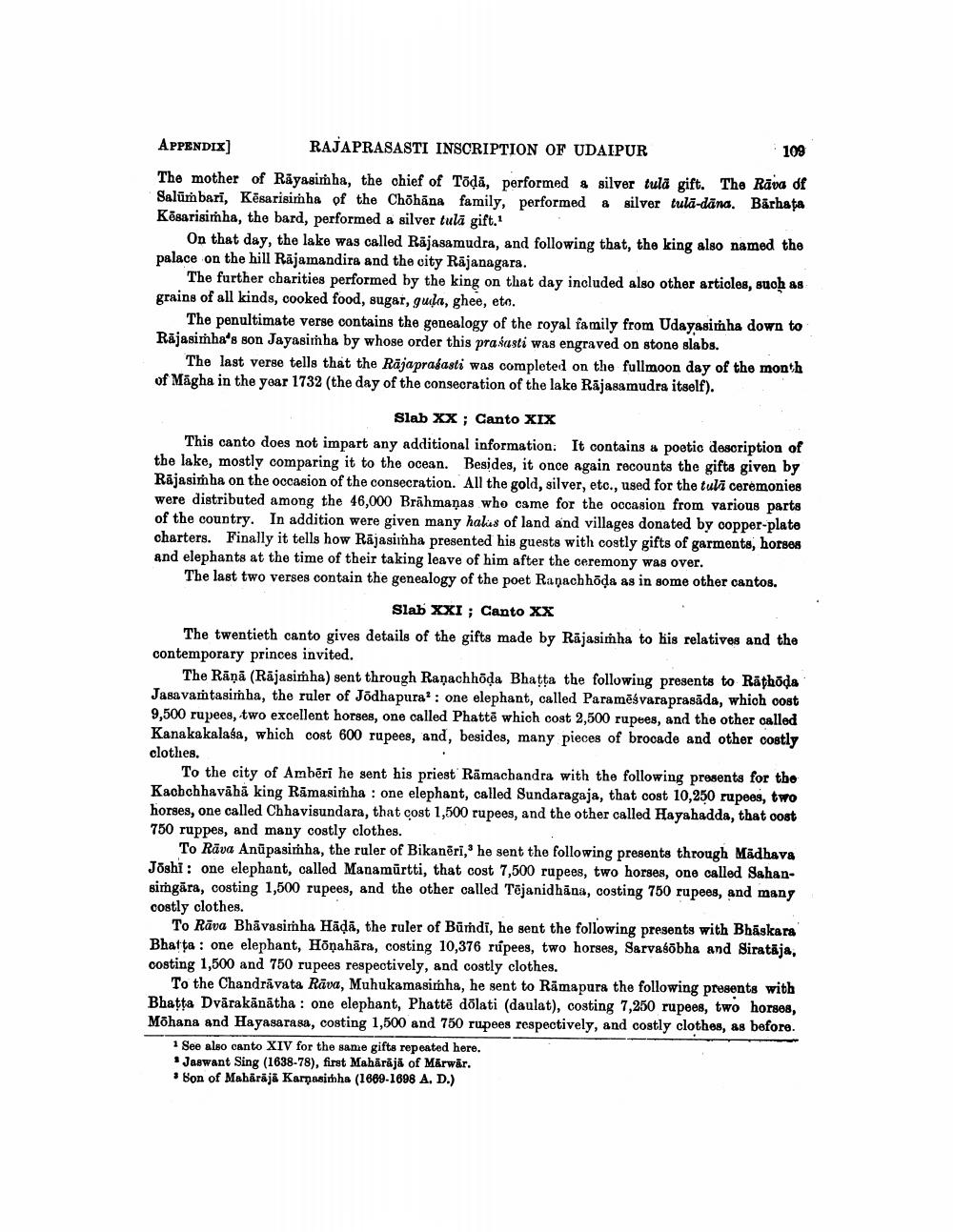________________
109
APPENDIX]
RAJAPRASASTI INSCRIPTION OF UDAIPUR The mother of Råyasimha, the chief of Tõdă, performed & silver tula gift. The Rāva of Salūmbari, Kēsarisimha of the Chōhāna family, performed a silver tulā-dāna. Barhata Kēsarisimha, the bard, performed a silver tula gift.
On that day, the lake was called Rajasamudra, and following that, the king also named the palace on the hill Rājamandira and the city Rajanagara.
The further charities performed by the king on that day included also other articles, such as grains of all kinds, cooked food, sugar, guila, ghee, eto.
The penultimate verse contains the genealogy of the royal family from Udayasimha down to Rājasimha's son Jayasimha by whose order this prasasti was engraved on stone slabs.
The last verse tells that the Räjaprasasti was completed on the fullmoon day of the month of Māgha in the year 1732 (the day of the consecration of the lake Rājasamudra itself).
Slab XX; Canto XIX This canto does not impart any additional information. It contains a poetic description of the lake, mostly comparing it to the ocean. Besides, it once again recounts the gifts given by Rājasimha on the occasion of the consecration. All the gold, silver, etc., used for the tuli ceremonies were distributed among the 46,000 Brāhmaṇas who came for the occasion from various parts of the country. In addition were given many halis of land and villages donated by copper-plate charters. Finally it tells how Rājasiinha presented his guests with costly gifts of garments, horses and elephants at the time of their taking leave of him after the ceremony was over. The last two verses contain the genealogy of the poet Ranachhöda as in some other cantos.
Slab XXI; Canto XX The twentieth canto gives details of the gifts made by Rājasimha to his relatives and the contemporary princes invited.
The Rāņā (Rājasimha) sent through Ranachhōda Bhatta the following presents to Rathoda Jasa vamtasimha, the ruler of Jodhapura?: one elephant, called Paramēsvaraprasāda, which oost 9,500 rupees, two excellent horses, one called Phattē which cost 2,500 rupees, and the other called Kanakakalasa, which cost 600 rupees, and, besides, many pieces of brocade and other costly clothes.
To the city of Ambēri he sent his priest Rāmachandra with the following presents for the Kachchhavāhā king Rămasimha : one elephant, called Sundaragaja, that cost 10,250 rupees, two horses, one called Chhavisundara, that cost 1,500 rupees, and the other called Hayahadda, that oost 750 ruppes, and many costly clothes.
To Rāva Anūpasimha, the ruler of Bikanēri," he sent the following presents through Madhava Joshi: one elephant, called Manamurtti, that cost 7,500 rupees, two horses, one called Sahansimgāra, costing 1,500 rupees, and the other called Tējanidhāna, costing 750 rupees, and many costly clothes.
To Rāva Bhāvasimha Hādā, the ruler of Būsdi, he sent the following presents with Bhāskara Bhatta : one elephant, Hönahāra, costing 10,376 rupees, two horses, Sarvasõbha and Siratēja, costing 1,500 and 750 rupees respectively, and costly clothes.
To the Chandrāvata Rāva, Muhukamasimha, he sent to Ramapura the following presents with Bhatta Dvārakānātha : one elephant, Phattē dēlati (daulat), costing 7,250 rupees, two horses, Möhana and Hayasaraga, costing 1,500 and 750 rupees respectively, and costly clothes, as before.
1 See also canto XIV for the same gifts repeated here. Jaswant Sing (1638-78), first Mahārajā of Marwār. Bon of Maharaja Karnasimha (1689-1698 A. D.)




